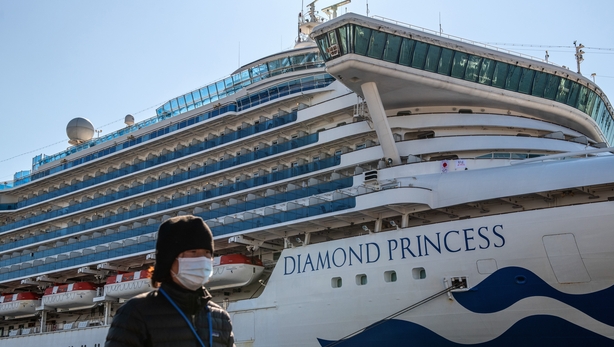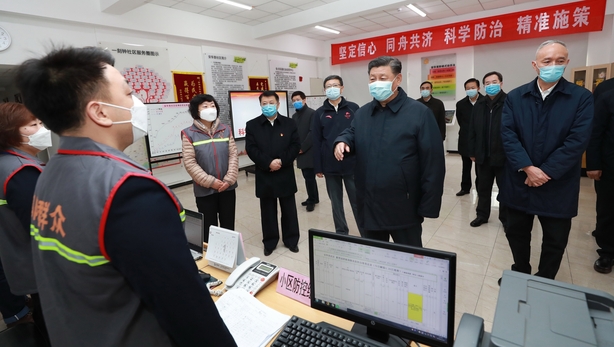China's coronavirus outbreak poses a "very grave threat for the rest of the world", the head of the World Health Organization (WHO) said in an appeal for sharing virus samples and speeding up research into drugs and vaccines.
Director-general Tedros Adhanom Ghebreyesus was addressing the start of a two-day meeting aimed at accelerating development of drugs, diagnostics and vaccines against the flu-like virus amid growing concerns about its ability to spread.
However, Mr Tedros also said he saw a "realistic chance" of stopping the outbreak.
"We are not defenceless. We have to use the current window of opportunity to hit hard and stand in unison to fight this virus in every corner.
"If we don't we could have far more cases and far higher costs on our hands," he warned.
To date China has reported 42,708 confirmed cases, including 1,017 deaths, Mr Tedros said.
"With 99% of cases in China, this remains very much an emergency for that country, but one that holds a very grave threat for the rest of the world," he told more than 400 researchers and national authorities, including some taking part by video conference from mainland China and Taiwan.
WHO has also said that 'Covid-19' would be the new official name for the deadly coronavirus.
Mr Tedros said the name had been chosen to avoid references to a specific geographical location, animal species or group of people in line with international recommendations for naming in order to avoid stigmatisation.
Yesterday, he referred to "some concerning instances of onward transmission from people with no travel history to China", citing cases this week in France and Britain.
Five British nationals were diagnosed with the coronavirus in France, after staying in the same ski chalet with a person who had been in Singapore.
"The detection of this small number of cases could be the spark that becomes a bigger fire. But for now it's only a spark. Our objective remains containment," Mr Tedros said.
We need your consent to load this rte-player contentWe use rte-player to manage extra content that can set cookies on your device and collect data about your activity. Please review their details and accept them to load the content.Manage Preferences
Here in Ireland, the National Public Health Emergency Team said there have been 65 suspected cases of coronavirus, all testing negative.
No case has been confirmed.
Dr Tony Holohan, Chief Medical Officer of the Department of Health, said Ireland remained prepared for a confirmed case.
Over 4,800 Personal Protective Equipment (PPE) packs have already been distributed to GP out of hours services, public health departments and GP practices.
A further 1,200 PPE packs are due to go out to GP practices today.
Read More:
Eight days in Wuhan, cut off from the world
UK coronavirus 'super-spreader' says he has recovered
China slowly gets back to work as coronavirus toll hits daily record
Indeed Irish workers told to work from home due to virus precautions
Two Japanese citizens evacuated from the centre of the outbreak in China have been diagnosed with the infection after initially testing negative, Japan's health ministry said.
One of the two, a man in his 50s who returned from the Chinese city of Wuhan on the first Japanese evacuation flight on 29 January, previously twice tested negative for the virus.
However, a third test 12 days later found the man - who has been isolated in his hotel room since his return - was infected.
According to the WHO, the coronavirus incubation period "could be up to 14 days".
The second evacuee, a Japanese man in his 40s, returned from Wuhan on 30 January and initially tested negative for the virus, but was diagnosed after a second test on Monday.
The new cases in Japan bring the number of infections there to 28, excluding dozens diagnosed aboard a cruise ship moored off the coast.
So far, 135 people on board the Diamond Princess have tested positive for the virus since it arrived off Japan on Monday.
Authorities are taking the most recently diagnosed 65 crew and passengers off the ship to hospitals.

The ship was carrying 3,711 people when it arrived off Japan on the evening of 3 February, and was officially placed into quarantine two days later.
Only those diagnosed with the virus or suffering other serious health conditions have been allowed off the boat, which is expected to remain in quarantine until at least 19 February.
People on board the ship tweeted that medicines were being delivered to passengers, and that the ship's captain had announced the vessel would head out to sea overnight to produce fresh water and other operations.
Japan has evacuated hundreds of its citizens from Wuhan since the outbreak began. They have been asked to self-quarantine, with most staying in government-appointed hotels for a period of 14 days.
Evacuees from the first flight, which landed 29 January, are expected to be released from self-quarantine this week after undergoing an additional test for the virus, officials said.
Japan is planning to send a fifth evacuation flight to Wuhan later this week.
Xi calls for more decisive measures
Chinese President Xi Jinping called for more "decisive" measures to tackle the outbreak in a rare visit to a frontline hospital.
At the hospital treating infected patients in Beijing, Mr Xi called the situation in Wuhan "still very grave" and called for "more decisive measures" to contain the spread of the virus, said state broadcaster CCTV.
Mr Xi has largely kept out of the public eye since the virus outbreak spiralled across the country from Hubei province to infect more than 42,000 people.
Yesterday, the president put on a blue mask and white surgical gown to meet doctors at Beijing Ditan hospital, observe the treatment of patients and speak via video link to doctors in Wuhan, state media said.

He then visited a residential community in central Beijing to "investigate and guide" efforts to contain the epidemic, said CCTV.
Video footage showed Mr Xi having his temperature taken with an infrared thermometer then speaking with community workers and waving at smiling residents leaning out of apartment windows.
The outbreak has prompted unprecedented action by the Chinese government, including locking down entire cities in Hubei as well as cutting transport links nationwide, closing tourist attractions and telling hundreds of millions of people to stay indoors.
The sweeping measures have turned cities into ghost towns - but there were some signs of normality returning as many went back to work this week.
Roads in Beijing and the financial hub of Shanghai had significantly more traffic, while the southern city of Guangzhou said it would start to resume normal public transport.
The Shanghai government suggested staggered work schedules, avoiding group meals and keeping at least one metre away from colleagues.
Many were encouraged to work from home and some employers simply delayed opening for another week.
State media reported that passenger numbers on the Beijing subway were half that of a normal working day.
Large shopping malls in the capital were deserted and many banks closed. Schools and universities across the country remained shut.
The toll has overtaken global fatalities in the 2002-03 SARS epidemic when China drew international condemnation for covering up cases, though Beijing has drawn praise from the World Health Organization this time.

